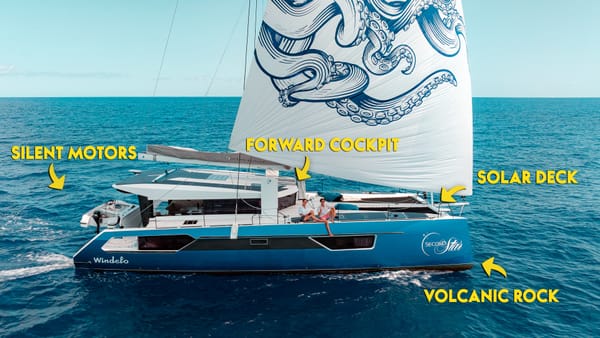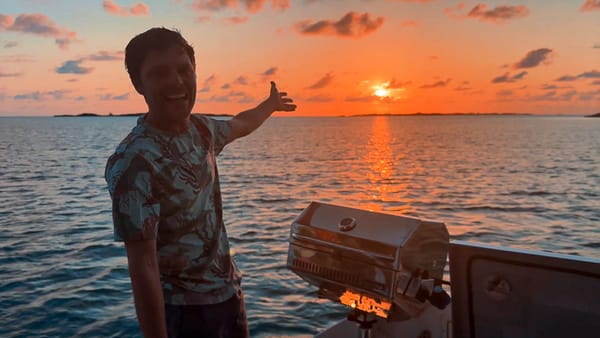Make Money and Travel – Off The Grid Apps
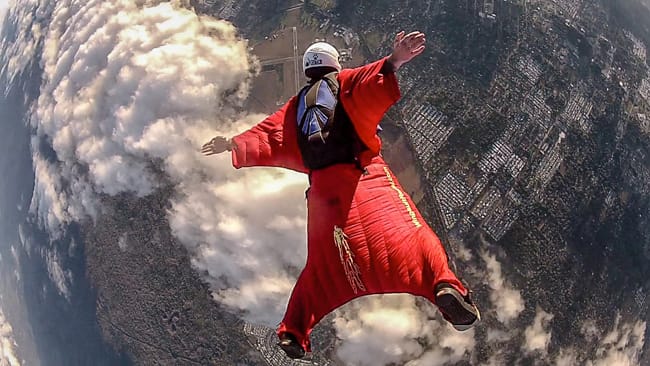
What’s crazier: Jumping out of a plane every day or quitting a 6 figure job to live in a van?
The first time I spoke with Mark Rickert of OTG Apps I thought he was awesome! He lives full time in a small RV, he has a well-paying mobile friendly job, he gets to camp for free most of the time and he has the ultimate thrill seeking hobby. I invited Mark to share on our Make Money and Travel series and he “jumped” at the opportunity to share his story in the hopes of convincing others to take the “leap of faith” needed to follow their dreams (I know, horrible puns, I’m sorry). I read Marks story and found I liked him even more than I expected (a real bromance on the horizon)…then I opened the photos he sent and now I hate him! Well, hate is a strong word, but come on, this is the dude’s office:
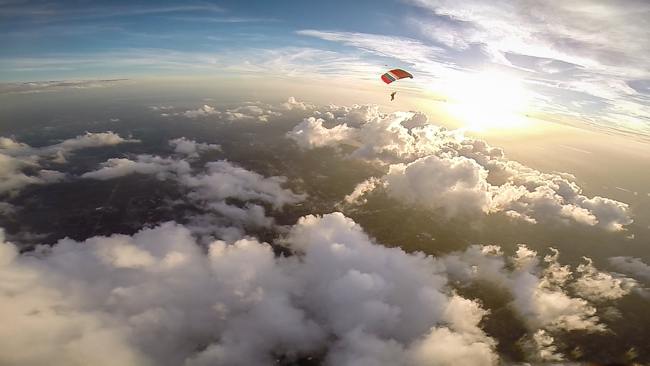
I’ll let Mark take over the introduction from here.
About Me & RVing – I grew up camping during the summers with my parents in the Adirondack Mountains of Upstate New York. My dad was a school teacher so he got the summer months off and we’d go into the mountains and spend weeks there. I never thought much about RVing from ages 14-31. My inspiration for wanting to go full-time in a small Class B RV was a former boss who had lived in one for a year and now lives a nomadic life in South East Asia. Around the time I started thinking about RVing full-time, I was learning to skydive. Because Skydiving is a very weather-dependent sport it has a unique subculture. People actually leave their RVs at the drop zone (DZ) and stay there all weekend. I have lots of friends who drive to the DZ on Friday after work and leave on Sunday when the sun sets. It’s an extreme sport, but it’s also a way of life. Then there are those who follow the seasons around to different DZs to work as parachute packers, tandem instructors, etc. Not having a 9-5 job and an apartment or a house is very accepted in skydiving because it’s fairly normal. I think as I gained confidence in myself to jump out if airplanes and trust my equipment to get me back to the ground safely, it made the fear of the unknown subside.
I’ve always been a bit of a minimalist (living in a 900 square foot apartment by myself was way too much space) so I knew I could pull off this lifestyle. I literally sold (or donated) everything I owned except what would fit in my van and headed out on the road within a few months of concocting the idea and starting to talk to friends and family about it.
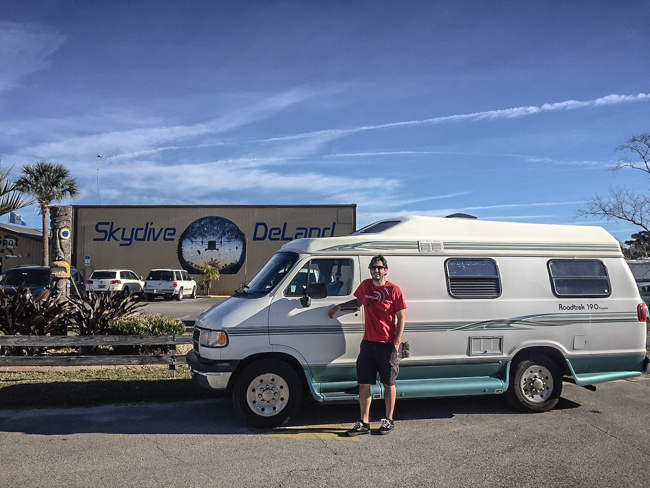
Specifically about my travels – I never have a destination in mind more than a month in advance… yeah, I have goals like, “I’d like to go to Alaska”, but I may go this summer and I may not… It just depends on where the winds take me. I tend to follow skydiving events. For instance – I was in Colorado and someone mentioned an event in Moab, UT the next weekend and asked if I was going. Of course, I said, “yes!” Utah is an amazing place and I got to hike the Arches National Park as well as see it from 2 miles in the air! When I was at that event someone told me about another event down at Skydive Elsinore in the Los Angeles area the next week so I went there… then I heard about a Halloween event near Bakersfield, CA… and it just continues like that. It keeps happening that I just go from place to place with no real planned destination in mind. But it’s amazing how close-knit the skydiving community is… I haven’t been to a single event where I didn’t already know someone there. It’s kind of cool having friends all over the country with a shared interest.
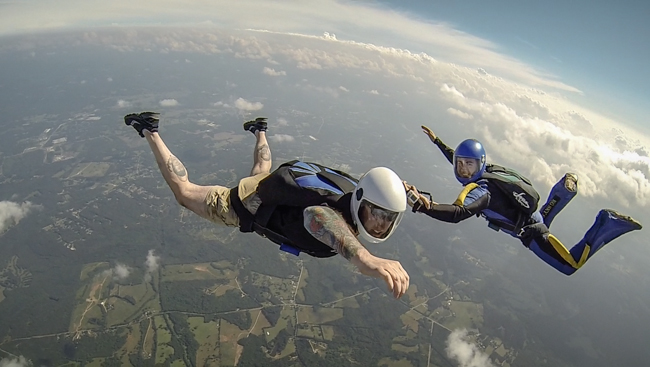
The Job(s)
Describe your working situation and what line of work you’re in; if you have multiple streams of income that fund your lifestyle, tell us what they are. Give us a little insight on how you decided to go mobile with your business.
I started my own company in 2011 for the one or two iPhone apps I had written in my spare time. This was mostly an exercise in running a business and to provide a tax shelter for the income the apps brought in. I never really took it seriously and I’d only publish a few new iPhone apps a year. It got to where I was starting to make $20k-$30k a year from this side business but I still viewed it as just “play money” since I’d always kept a steady full time job doing web and mobile development. I had worked for about 3 years as a remote employee at my last job so they were completely on-board with me working from the road. They knew I had the discipline and self-motivation to get things done without actually being in the office. My boss was on-board so I started working 40 hours a week while traveling the country. I did this for about 3 months until I realized that I needed to cut back how much I worked if I was going to achieve the lifestyle I wanted. The ultimate goal was always to do my own thing and my boss and the owner of the company knew that from multiple conversations we’d had over the 5 years I worked there. Everyone was completely supportive (albeit sad that I was leaving) when I announced that I was going to do my own thing full time.
I knew I could do it, but I always lacked the guts to just quit my full time job. Maybe being out on the road and having this amazing adventure gave me the courage to try something new. Since I’d already been running my business for a few years and my apps were already generating some significant income, all I had to do was sell some time consulting and I’d be able to make this work. Luckily, I’m fairly well known in a few niche programming communities and people had been seeking me out to work for them quite a bit already. These leads also helped me feel comfortable with leaving my 9-5 to focus on my company named OTG Apps (yes OTG stands for Off-The-Grid).
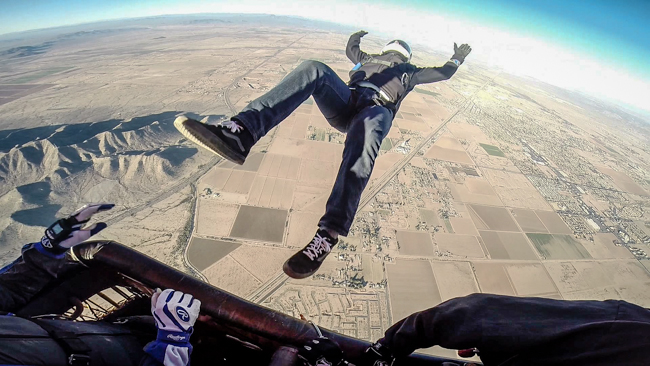
The Hours
How many hours do you put in a week and what does a typical workday look like for you?
I try to bill at least 20 hours a week to clients. I work on my own products if I have any extra time in the week. I’ve constantly got new ideas for apps and have about 3 in the works at any given time. Some pan out and some don’t, but you have to at least give it a shot to see if the idea will work. I also have to do maintenance on current products like fixing bugs, adding requested features, testing, and updating them for new versions of iOS that come out.
I’ve always been an early riser so, I’ll try to wake up with the sun and barely ever set an alarm. Because of limited space in my Class B I either turn the passenger seat 180° and work from there, or just set up on my bed with my laptop. First thing I do in the mornings is start up my generator and make a cup of coffee with my Keurig single cup coffee maker. This also gives me a chance to top off any electronics that need charging for the day ahead. Then I’ll grab my laptop and check email and maybe start working on a client project while my mind is fresh and I’m not thinking about anything else from the day. I generally put in a few hours of work in the mornings then emerge from my RV around 11 or so and skydive the rest of the day. If I’m not at a DZ, I’m traveling to the next one so I’ll work then drive for a while. Once the jumping ends for the day or I’m situated in my new overnight area, I’ll work a bit more in the evenings. 3-4 hours a day of good, solid work is my goal.
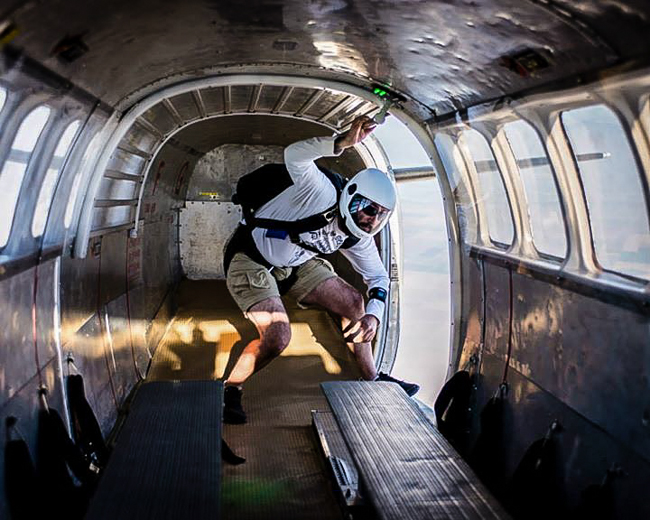
The Pay
If you are willing to say, what is the average yearly salary for someone in your line of work? How long did it take for you to start earning a comfortable/typical living for this line of work?
I have a degree in Management Information Systems from the University of South Florida and my first job out of college made $30k/yr. That was 12 years ago. I’ve worked my way up the ranks from Junior Software Developer to Senior Systems Engineer. Average salary for that level of computer programmer is just over 6-figures, but it can vary depending on location. Since I’ve gone full-time in my RV and quit my full-time job to do my own thing, I’m working about half as much and making a little more than I did at my old 9-5, however I have added expenses of things like health insurance and self-employment tax. I took all these things into account (as well as lost compensation from not having retirement plan matching) before I decided to quit my full time job. My app company has always made me another $20k-$30k a year and is generally self-sustaining and fairly consistent each month.
I’m completely debt free and the RV was paid for in cash. I put a lot of money away each month but I don’t work because I need the money, I work because I love the work! I started this adventure with a 6-month emergency fund while I was living in an apartment, so I could probably just not work for a year or more and be OK at this point, but that’s not the kind of person I am… I have to keep my mind engaged all the time. Working hard also helps me feel less guilty about skydiving all the time… sometimes I think nobody should be allowed to have this much fun!
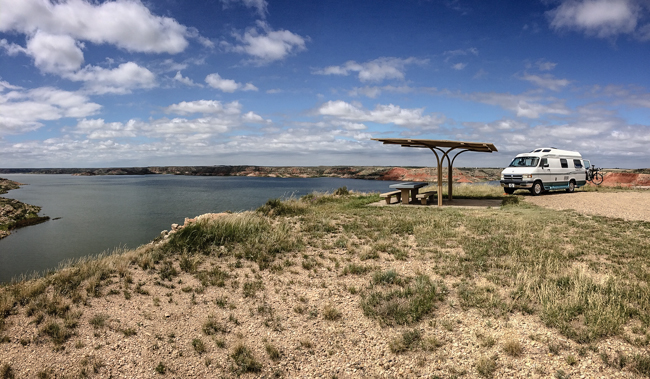
The Tools
What are the most essential pieces of equipment, education or programs you need for working while traveling?
I have to have my laptop! I’ve got a 15-inch Retina 2013 MacBook Pro with a 2 GHz Intel Core i7 processor. The battery life is amazing on it which is essential for me since I do a lot of boondocking on the road. I consider software to be tools as well, so here’s a few I use on a regular basis to get my work done:
- Terminal (Free, already on your Mac) – this is the application I spend most of my time in… the UNIX shell. I can basically do anything on my computer with the terminal from rebooting the machine to editing text files to uploading and downloading files from the web. Terminal is intimidating to most people because it’s all text, but using it for so many years and understanding its power, I feel right at home using it.
- Tower ($59 – http://www.git-tower.com/) – I really like this graphical user interface (GUI) app for the GIT source code management application and use it all the time to help me maintain a history of changes to the code I write. It also helps me easily share my code with coworkers and friends online.
- Sublime Text 2 ($70 – http://www.sublimetext.com/) – This is my primary code editing application. It knows what computer language I’m writing in any given file and automatically applies color coding to the text so it is easy to visually identify different parts of the code.
- Harvest (Free-$99/month – https://www.getharvest.com/) – I use Harvest to track my billable time and to bill clients. They have a great time tracking app for the desktop which makes it easy to start and stop timers as well as switch tasks and make notes about what I did.
- Sketch ($99 – http://bohemiancoding.com/sketch/) – The cheap alternative to Photoshop. Not only is it cheaper, I like it better. This graphics editing application can do all sorts of cool things and I’m still learning all of its capabilities since I’m not a graphic designer.
I don’t have any formal education programs that I use on the road, but I have a fairly geeky circle of friends in my social networks that keep me informed of the latest tools and techniques. I could read articles all day long if I clicked every interesting link in my Twitter feed so I have to limit the amount of time I spend reading educational articles.
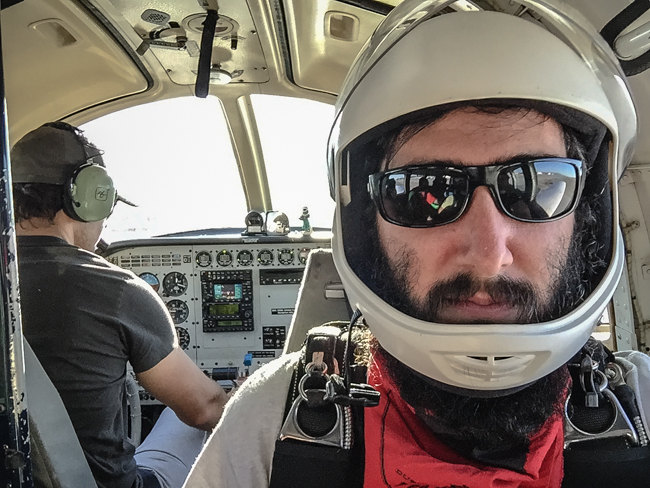
The Client
Who are your clients? Do you find them or do they find you and how? What is your rejection rate? How many clients do you pitch to finally win over one?
I’ve got all sorts of apps and I’ve focused on two major niches: direct sales consultants and beer nerds/enthusiasts. I have a few apps for each niche and then a few outliers for diversity. I always write software for things I know a lot about so it helps me connect with my audience. Knowing my target market also helps me effectively choose keywords in the app store so my apps can be more easily found when searching. I don’t really do advertising so word of mouth is crucial for me. I tried Facebook and Google ads, but neither really boosted revenues enough to justify the cost of the ads.
For the consulting side of things, I work as a contractor for a company in San Francisco that finds work and funnels it to me so that I can focus on writing software and not on the sales cycle. This works great for me because they constantly have work that I can do. I know everyone at the company personally and we all get along really well. I also have my own clients and they typically find me because of my expertise in iOS development and because of code I release online for free. Typically these clients who seek me out are already using some of the code I’ve written and given away online and want to hire me to build more features in that code library or to use it to build out their product.
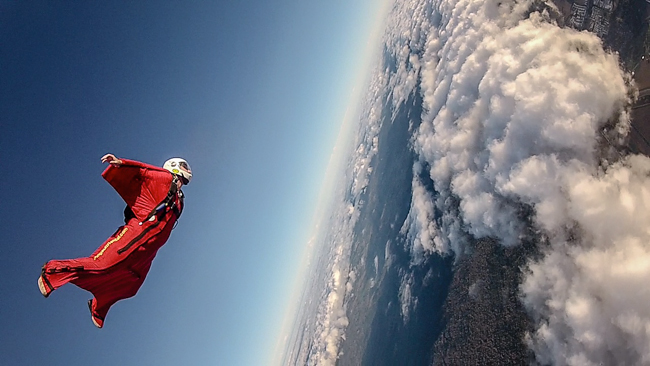
The Up’s
What are the best things about working while traveling? Those things that make you think wow; I really am living the dream.
I grew up on the East Coast and I’d never really seen any part of the West. I’d fly to Las Vegas or San Francisco for a few days but I never really traveled through those parts of the US. Driving from place to place and being able to watch as the landscape, scenery, flora, and fauna change has been an amazing experience.
It’s amazing that I get to travel and participate in a sport I love and still be able to support myself with a really good income. I’ve met so many amazing people on the road and made lots of friends so far in my journey.
Living on the road has caused me to start looking at things with new eyes. I now see beauty and detail in the smallest things and because my surroundings are constantly changing; I try to soak it all in since I never know when I’ll be in that particular location again.
The Down’s
What are the most frustrating things about working while traveling? Any ways you’ve found to avoid or cope with this frustration? How do you feel about living in such a small space?
I have a teeny refrigerator so most of my food is packaged or dried. I’d prefer to eat more healthy, but a small living space that sometimes is not climate controlled makes it difficult (but not impossible) to eat as healthy as I’d like. I eat a lot of granola and try to have some fresh fruit on hand whenever possible.
Battery power. My RV came with 1x 50 amp hour 12 volt battery. It was terrible. I have a lot of electronics so keeping them all charged is a monumental task. The battery also didn’t have enough wattage to charge my laptop without a huge voltage drop that would eventually engage my inverter’s warning mechanism and turn off. I’ve remedied this by installing 2x 105 amp hour AGM batteries for a total of 210 amp hours. I had to get AGM (sealed) batteries since the only storage for the batteries is under my sleeping area. As most RVers know, lead acid batteries give off deadly fumes while being charged and I didn’t want to die in my sleep when I plugged into shore power and the batteries started charging. A solar system will be my next big upgrade.
Cell reception in mountainous areas and national parks can be a hassle. I took your advice and got the Wilson Mobile 4G Vehicle Signal Booster device and it’s been a life saver for times when I was boondocking and needed Internet to get some work done and only had 0-1 bars. Note: the booster works great for voice reception but in my experience only marginally improves Internet speeds.
Hindsight
If you could go back in time and give yourself 1- 3 pieces of advice about starting in this line of work, what would it be?
Don’t go to college. Seriously just don’t go. College was a good experience, but didn’t teach me many of the skills I rely on to do my work now. Those years would have been better spent doing an apprenticeship or teaching myself a new programming language. Plenty of programmers make 6-figures and don’t have a college degree. It just matters how driven you are to learn and be the best at what you do.
Learn more about running your own business. I had coding mentors but I would have loved a business mentor… someone to show me how running a small business actually works. I really hate accounting but I think it’s because I’m just not comfortable with doing P&L’s, balance sheets, and income statements yet. I’m sure I’ll get better at it in time, but I doubt I’ll ever like doing it.
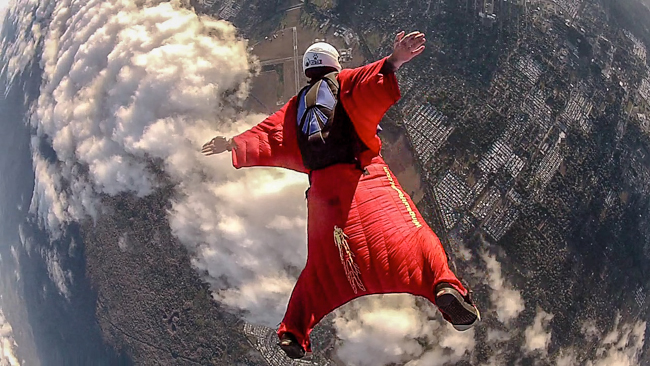
The Fantasy Job
What is one of the most creative ways you’ve heard of someone funding a location independent lifestyle? The one that made you wish you had thought of it first!
I interact with a lot of skydivers that live in RVs or in the bunkhouses at the DZs I visit. They’re usually parachute packers or tandem jumpers or instructors and don’t make a whole lot of money. Because skydiving is a highly weather-dependent sport, they don’t make money when the weather is bad. When the weather turns bad, I just go back to my RV and start working! I think I’ve got the fantasy job right now… doing what I love for work and doing what I love for fun… all while traveling the country. My ultimate goal is to have mostly passive income that supports the lifestyle I want to live and also gives me extra money to put away for retirement. I work every day with the goal in mind of putting systems and processes in place that ensure I can make money while I sleep and while I’m falling from a plane at 120-180mph, 2 ½ miles above the ground!
Whenever I tell my story to someone, they almost always say something like, “you’re so lucky… I wish I could do that!” Believe me, I know how lucky I am and it certainly doesn’t go unappreciated.
Mark, thanks for sharing, BTW – I want your business hours! Nikki and I live a pretty sweet life, but your work-life balance seems perfect! Anyone else out there agree?
My takeaway from Mark’s story: Dream it, build it then do it!
Please take a minute to share your thoughts in the comments below, we’d love to hear them and I’m sure Mark would like to know if he’s sparked your “heck yea I’ll jump” adventurous side.
If you’d like to share your Make Money and Travel story please send us an email.

